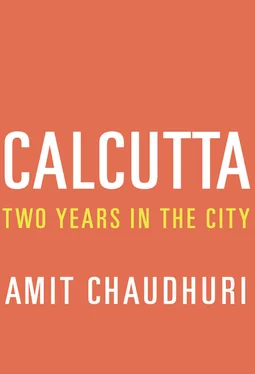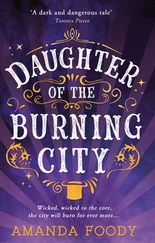My relatives, located in various parts of the city, had made their way here a little before and during Partition. They were crucial coordinates in my holidays, and set those holidays’ tone — of oddity and the absurd. My relatives, mainly on my mother’s side, had among them one or two traders and country yokels; but mostly they were engineers, with a few school headmistresses and provincial civil servants in their ranks, and were among the funniest people I knew. They were, I think, cosmopolitans. One sign of the cosmopolitan is their proprietary stake in the world of reading and books; another sign, emerging from the last one, is the tendency to quote constantly; a third sign, probably because it seems their true habitat should be within the covers of a book, inside a fiction, is that they seldom own property — which adds imperceptibly to their air of not belonging. In my relatives’ cases, many of them didn’t own property until late in life because of their displacement. Their intrinsic oddness was accentuated by their speaking to one another not in Bengali, but in Sylheti — a dialect and offshoot that was, to me, and particularly to them, a riot. For korchhi or “doing” in Bengali, they’d say kortesi ; for hae or “yes” they’d say the imbecilic haw ; for kano or “why” they’d utter the plangent kané . “Chh” sounds would become the sibilant, childish “s”; the “k” sound approach “h,” as in Arabic. Their jokes were rude, freely and opportunistically making use of farting and shitting — insistently expressing a side less savoury than their lofty Rabindrik or Tagorean loyalties. Naturally, we children enjoyed this humour to a point. One of the things that earned an almost regretful laugh from the elders was the faux-limpid but inadvertently exculpatory line from a Tagore song, “Tari te pa dei ni ami,” or “I didn’t step into the boat.” But if the words pa dei ni (“didn’t step”) are said together, as in the song, they merge into padini , or the hasty clarification, “didn’t fart.” And Tagore’s line becomes indistinguishable from “I didn’t fart in the boat.” I doubt if I’d have entered that dimension of the Bengal Renaissance but for the tastelessness of my uncles and my mother.
Going out now to the government-made flat in the CIT Buildings — a prefabricated socialist structure, like something out of Prenzlauer Berg — was to make yet another Calcutta-type visit. No visit for the emigré—whether it’s a family visit or of another kind — is anything but a rehearsal of a past journey to a meeting place, a civilised interregnum in which pleasantries and gifts are exchanged in homage to that first visit in the home town, which was just a simple visit. No visit, later, is what it appears to be, but an echo of that earlier meeting, when we were beginning to know each other, and in lieu of the meeting that will take place when we return to where we then met. I recall Mini mashi and Shanti mashi making their entrance into my uncle’s house on Pratapaditya Road before lunch — they must have been in their late forties — with a pot of Bhim Nag yoghurt from their neighbourhood. Even then, some part of me knew that this journey had been made with a previous journey in mind, which had been covered on familiar terrain, and that civilities would be exchanged, jokes laughed at, and the pot of yoghurt given, all in a rehearsed, unencroaching manner, in expectation of the original setting being restored in the future. Till then, this , evidently, is where they were.
I’d like to thank Peter Straus, my agent, for first suggesting, in 2005, that I write this book, and for not minding too much when I shot down the idea. Having written three novels about Calcutta, I felt reluctant to write about it again, not least because I thought that the city that had once excited me in all kinds of ways had changed permanently. It was when I began to come to terms with that change, and the new city that had resulted from it, that I relented and realised that I had a book to write. For Peter’s continuing belief in my work, I’m grateful.
I’m grateful to Sonny Mehta for the same reason, and for commissioning this book. My thanks to Chiki Sarkar and Rosalind Porter for their great enthusiasm and responsiveness, and for bringing a freshness to my life as a published writer. To Diana Cognialese, I remain indebted, as ever, for her intelligence and support.
Jaishree Ram Mohan should be acknowledged for the high standards of her copy-editing. I’d like to thank Maharghya Chakraborty for being my cheerful amanuensis for the manuscript, and my wife for chipping in kindly — and substantially — at the end. Whatever little remained I typed with one finger from my longhand original.
Roughly half of Chapter Five appeared as a Diary piece in the London Review of Books ; my thanks to the editors.
I should also thank Sukanta Chaudhuri, editor of Calcutta: The Living City (OUP), from whose pages I’ve quoted R. K. Dasgupta.
The excerpt quoted from Giorgio Bassani’s The Garden of the Finzi-Continis (Penguin Modern Classics) is translated by Jamie McKenrick.
I’m grateful to Dwaipayan Bhattacharya and Rudrangshu Mukherjee for helping with information.
To my wife, Rosinka, I’m indebted in ways too various to enumerate; but I’d especially like to say that her discussion of the poet Iswar Gupta, quoted in these pages, can be found in her critical study of poetry in nineteenth-century Bengal, The Literary Thing: History, Poetry, and the Making of a Modern Cultural Sphere (OUP). This book and her work in general have been an invaluable, irreplaceable resource.
The book was written roughly between August 2009 and December 2011, and is a personal record of that time. Needless to say, whatever has happened in West Bengal and its capital since then is, given the period Calcutta covers, beyond the book’s parameters.
18 August 2012
Amit Chaudhuri is the author of several award-winning novels and is an internationally acclaimed musician and essayist. Freedom Song: Three Novels received the Los Angeles Times Book Prize for Fiction. His many international honors include the Commonwealth Writers’ Prize; most recently, he became the first recipient of the Infosys Prize for Humanities — Literary Studies. He is a contributor to the London Review of Books, Granta , and The Times Literary Supplement . He is currently professor of contemporary literature at the University of East Anglia and a Fellow of the Royal Society of Literature.












